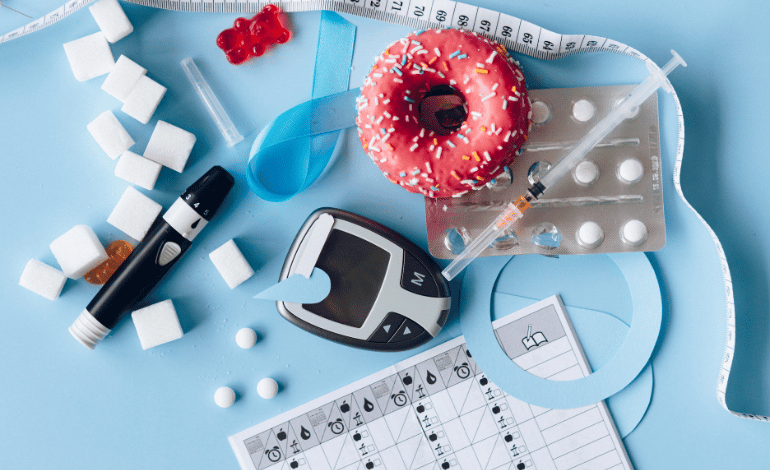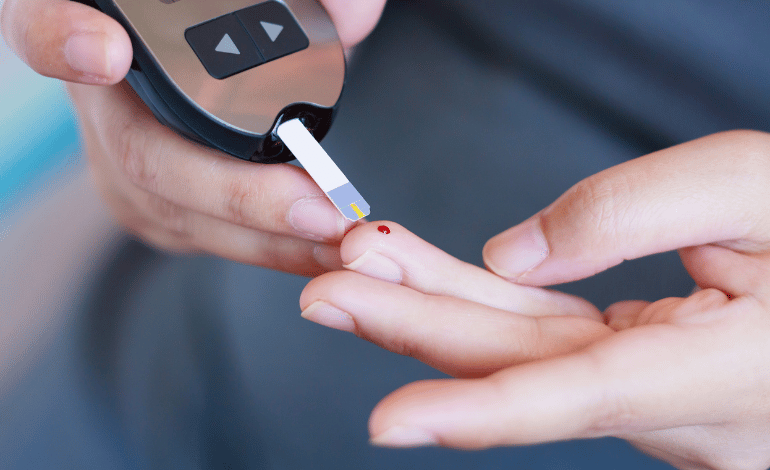21 Successful Tips to Manage Diabetes

21 Successful Tips to Manage Diabetes: Managing diabetes can be a challenging and ongoing process, but there are steps you can take to help keep your blood sugar levels under control and reduce your risk of complications. Here are 21 successful tips for managing diabetes, including making healthy lifestyle choices, staying on top of medication and monitoring, and seeking support from healthcare professionals and loved ones. By incorporating these tips into your daily routine, you can take an active role in managing your diabetes and improving your overall health and well-being.
1. Keep your blood sugar levels within your target range by regularly monitoring your blood glucose levels: Regular monitoring of blood glucose levels helps you understand how different foods, activities, and medications affect your blood sugar levels. Talk to your healthcare team about how often you should check your blood sugar levels and what your target range should be.
2. Eat a balanced diet that is low in sugar, salt, and saturated fats, and high in fiber, whole grains, fruits, and vegetables: A healthy diet is essential for managing diabetes. Choose foods that are nutrient-dense and low in calories, sugar, salt, and unhealthy fats. Incorporate plenty of fiber-rich foods like whole grains, fruits, and vegetables, which can help regulate blood sugar levels and reduce the risk of heart disease and other complications.
3. Maintain a healthy weight by following a healthy diet and engaging in regular physical activity: Maintaining a healthy weight is important for managing diabetes. Being overweight or obese can make it more difficult to control blood sugar levels and increase the risk of complications. Incorporating regular physical activity into your daily routine can help you lose weight or maintain a healthy weight.
4. Exercise regularly to help control your blood sugar levels and improve your overall health: Regular exercise can help improve insulin sensitivity and lower blood sugar levels. It can also help you maintain a healthy weight, reduce stress, and improve cardiovascular health. Talk to your healthcare team about the best exercise plan for you.
5. Take your medications as prescribed by your doctor to manage your blood sugar levels: If you have been prescribed medication for diabetes, it is important to take it as directed. Talk to your healthcare team about how and when to take your medications and be sure to refill your prescriptions on time.
6. Keep your stress levels under control by practicing relaxation techniques such as deep breathing, yoga, or meditation: Stress can cause blood sugar levels to rise, making it more difficult to manage diabetes. Practicing relaxation techniques can help reduce stress and improve overall well-being.
7. Get enough sleep each night to help regulate your blood sugar levels and reduce your risk of complications: Lack of sleep can interfere with blood sugar regulation and increase the risk of complications associated with diabetes. Aim for 7-8 hours of sleep each night and develop a regular sleep routine.
8. Quit smoking to reduce your risk of heart disease, stroke, and other complications: Smoking can increase the risk of heart disease, stroke, and other complications associated with diabetes. Quitting smoking can improve overall health and reduce the risk of these complications.
9. Limit your alcohol intake to help control your blood sugar levels and reduce your risk of complications: Alcohol can interfere with blood sugar regulation and increase the risk of hypoglycemia (low blood sugar) in people with diabetes. If you choose to drink alcohol, do so in moderation and talk to your healthcare team about how to do so safely.
10. Check your feet daily for any cuts, sores, or blisters, and report any problems to your doctor: Diabetes can cause nerve damage and poor circulation, which can lead to foot problems. Checking your feet daily and reporting any problems to your doctor can help prevent complications and infections.
11. Take care of your teeth and gums by brushing and flossing daily and visiting your dentist regularly: People with diabetes are at higher risk of gum disease and other oral health problems. Good oral hygiene habits and regular dental check-ups can help prevent these complications.
12. Manage your blood pressure and cholesterol levels to reduce your risk of complications: High blood pressure and cholesterol can increase the risk of heart disease, stroke, and other complications associated with diabetes. Regular monitoring and management of these levels can help reduce the risk of complications.

13. Stay hydrated by drinking plenty of water and other sugar-free beverages: Dehydration can affect blood sugar levels and increase the risk of complications. Aim to drink at least 8 glasses of water per day and avoid sugary drinks that can cause blood sugar spikes.
14. Keep track of your blood sugar levels, diet, exercise, and medication in a diabetes management journal: Keeping a journal can help you track your progress and identify patterns in your blood sugar levels, diet, exercise, and medication. It can also help you identify areas for improvement and discuss them with your healthcare team.
15. Wear a medical alert bracelet or necklace to alert others in case of an emergency: In the event of a medical emergency, a medical alert bracelet or necklace can provide crucial information about your condition and help ensure prompt and appropriate medical care.
16. Keep emergency supplies on hand, such as glucose tablets, snacks, and insulin, in case of a low blood sugar episode: Low blood sugar can be dangerous and require immediate treatment. Having emergency supplies on hand can help you manage low blood sugar episodes quickly and effectively.
17. Stay Up-to-Date with your recommended health screenings, such as eye exams, kidney function tests, and cholesterol checks: Regular health screenings can help detect potential complications early and allow for prompt treatment.
18. Stay informed about the latest developments in diabetes research and treatment options: Advances in diabetes research and treatment are constantly being made, and staying informed about these developments can help you make informed decisions about your care.
19. Get support from family, friends, and support groups to help manage the emotional and physical challenges of living with diabetes: Living with diabetes can be challenging, and it is important to have a support system in place to help you manage the emotional and physical aspects of the condition.
20. Work with your healthcare team to develop a personalized diabetes management plan that fits your individual needs and goals: Diabetes is a complex condition, and there is no one-size-fits-all approach to managing it. Working with your healthcare team to develop a personalized management plan can help ensure that your needs and goals are addressed.
21. Don’t be afraid to ask for help when you need it: Managing diabetes can be overwhelming at times, and it is important to know that you are not alone. Don’t be afraid to ask for help from your healthcare team, family, friends, or support groups when you need it.
In conclusion, managing diabetes requires a multi-faceted approach, including regular monitoring of blood sugar levels, following a healthy diet plan, exercising regularly, taking medications as prescribed, and managing stress. It’s also important to avoid unhealthy habits such as smoking and excessive alcohol consumption, and to take care of your overall health by getting enough sleep and staying hydrated. With proper management, people with diabetes can lead healthy and fulfilling lives. It’s essential to work closely with your healthcare provider and stay informed about new developments and treatments in diabetes management.
Read More: Diabetes: Types, Causes, Symptoms, And Treatments








